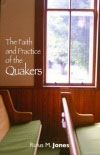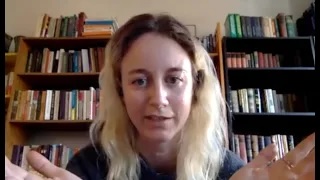You know what time it is, how it is now the moment for you to wake from sleep. . . . The night is far gone, the day is near. Let us then lay aside the works of darkness and put on the armor of light. —Romans 13:11-12
A little over a year ago I sat at the Young Adult Friends’ Gathering in Burlington, New Jersey, and listened while Friends expressed needs: to learn more about early Friends and early Quakerism, to become more evangelical in our faith, and to begin a dialogue between different branches of Quakerism. Some Friends spoke of the need to return to a more traditional way of conducting meetings and ordering the Religious Society as a whole. Others spoke to the need to spend just as much time contemplating our belief in the Spirit and God as in going to protests and espousing nonviolence.
Even though I attended this conference over a year ago and have attended many conferences since then, that one made a particular impact on me as well as on many other young adult Friends who attended. Many of the messages and lessons I took away from that experience have been restated and redefined in other conferences, but as I read over my initial reaction from that conference I cannot deny the lasting Truth I found there. Young adult Friends spoke of the need for change and for a loving community. They showed me (and I hope many other Friends) that young adult Friends are able and willing to take up the work that is in front of us. I have taken the lessons of that conference with me on my journey with the Spirit. They have given me hope for young adult Friends and for the Religious Society of Friends as a whole.
We are a community afire. This sounds like a grandiose, even outlandish statement, yet I have been feeling the slight stirrings of change and movement for a long time. Prior to attending the Burlington conference I had spoken, in person and via blogging, with Friends who were deeply religious and serious about the state of Quakerism. They spoke about what they loved and what frustrated them about Quakerism. They spoke of the work that they were doing. But although I have seen the seeds of energy and change, I have also been plagued by doubts. Far too often I have become discouraged by what I see as a weakening of Quaker identity, and a tendency for Friends to forget or overlook that the Religious Society of Friends is in fact an organized religion with a history, a faith, and a set of traditions and practices. I have also been discouraged by some Friends’ apathy towards problems within Quakerism and work that needs to be done, and by the distressing inability of many Friends to criticize any aspect of Quakerism.
I have seen these problems among Friends of all ages. However, since older Friends are more visible, we often see Quakerism’s flaws, as well as its strengths, most clearly in them. In my experience, young Friends have have shown these same flaws in troubling ways. (More troubling still, many of the young Friends I have known have demonstrated less of the truly great parts of Quakerism.) But at the young adult Friends conference in New Jersey, I felt an overwhelming sense of Spirit and power. I encountered other young Friends who were serious about their faith and about their commitment to the Spirit. Like almost everyone I have talked to about the conference, I feel it has changed my faith and my relationship with Friends.
I come from New York Yearly Meeting, which I love. I especially love the retreats, the Powell House conference and retreat center, and the Friends with whom I grew up. My home meeting is still the one where I feel most comfortable. Yet I feel that something is missing from Quakerism, especially the Quakerism I see practiced by the youth around me. Very few times have I been in a group of young Friends who take Quakerism very seriously. In most of my encounters with young Friends, I have found them fiercely proud of calling themselves Quaker, but not caring about talking or studying about what being Quaker means, about Quaker theology, or even about what part they are playing in the Religious Society of Friends. Over the summer I attended New York Yearly Meeting and was appalled by how few young and young adult Friends attended business meeting. Young Friends often seem more than happy for Quakerism to be a bunch of really nice people with whom to play ultimate Frisbee, to be in a cuddle-puddle, to play a good game of wink, or to hear a message in meeting about someone’s cat. When asked about Quakerism, young Friends often describe it as "like Unitarian Universalists, only cooler" or as "a group of people where you can believe whatever you want."
I don’t want Quakerism to be just a version of Unitarian Universalism. I want it to stand on its own, to be something more. I want Quakerism to be a radical, living faith. I want it to be a faith with a history and with a complex spiritual, theological core from which radical and often controversial witness stems. I want this from the Religious Society of Friends, intensely and passionately—sometimes so intensely I can barely stand it. Most frustrating of all is that I know Quakerism is, can be, and has been what I want it to be. It is at its heart the faith I yearn for, but many Friends have just forgotten this, or never learned it.
Ask and it will be given you; search and you will find; knock, and the door will be opened for you. —Matthew 7:7
I can’t really pin down what was the most important moment for me during the Burlington conference. I know many times throughout the weekend it touched me deeply and allowed me to move to a better spiritual place. It changed the way I view the Religious Society of Friends, but above all, it changed the way I think about young Friends. During the weekend I met, talked, and prayed with others just as serious as I, and in some cases much more spiritually mature. Whether they were Christian and based their faith in the Bible and the teachings of early Friends, or nontheist and based their beliefs in social justice and community, everyone present took Quakerism very seriously. I was moved by the level of commitment to Quakerism and change that I encountered there. The young adult Friends at the conference were some of the most motivated Friends I have ever met. Since then, I carry with me the deep knowledge that we as the Religious Society of Friends can be a vibrant, loving, functioning community under God, and that young and young adult Friends have a place in building and living in that community.
I have been accustomed to Friends being either unaware of the concerns they might have with the state of our religion, or unwilling to voice such concerns. Never had I been in a group of Friends my own age who did voice them. Never had I heard another Friend rise during meeting and tell the group of worshipers that the Religious Society of Friends was broken and that we had allowed this to happen. Many Friends expressed the belief that Quakerism could be so much more than what had been offered to them as children of their meeting.
The young adult Friends in Burlington hungered for a deeper, more connected faith than what they felt had been offered, and they were ready to take action. The Spirit moved among us there, not only causing us to give Spirit-led ministry, but also to make plans to revitalize Quakerism. For one of the first times I knew the Blessed Community: a fellowship moved, strengthened, and empowered by God. Although I have stood in a Community of Spirit with Friends many times since then, the retreat in Burlington continues to be the first and only time I have had such an experience with young adult Friends. God willing, it will not be my last. I was reminded there of one of my favorite passages from the Bible: "You are the light of the world. A city on a hill cannot be hid" (Matthew 5:14). We are indeed the Light of the world, and we will build a city on a hill, a community in the image and grace of God. I hold onto the hope and the promise that the Religious Society of Friends is moved by the Spirit. We are on fire.



